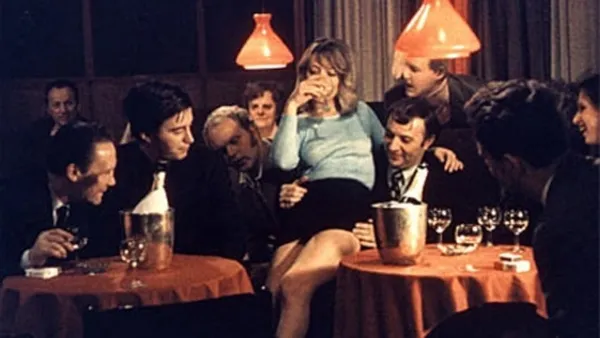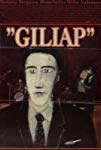Eye For Film >> Movies >> Giliap (1975) Film Review
Giliap
Reviewed by: Amber Wilkinson

You have to be willing to go with the flow with Roy Andersson's second film Giliap, a free-ranging work that begins somewhere in the region of Nordic black comedy before wrapping itself around a wistful French-style potential romance before ending up in noir thriller territory. A disaster with critics and audiences at the time of its release, it would mark the beginning of a feature-length film hiatus for Andersson that wouldn't end until Songs From The Second Floor in 2000.
Catching it this week at the Seville Film Festival, I wonder if much of what 'did' for the film at the time of release was less to do with its story than its tonally bracing style - mixing arid humour, bleak fatalism and unspecified yearning - and a general unwillingness to sit in a pre-designated pigeon hole in terms of genre. The real and the absurd walk arm in arm here, as a gale of inappropriate and unsettling laughter breaks out in an otherwise normal canteen scene, or we learn a photo of Anna's mum and dad - "He looks like Danny Kaye" - is just something that happened to come with the apartment where she is staying. They make strange, but not unattractive, bedfellows.

The story is largely set in and around the unprepossessing Hotel Buserewski - the sort of offbeat establishment that also wouldn't look out of place in an Aki Kaurismäki film. "Where are the decent people?" its draconian owner laments from his wheelchair after a drunk has been thrown out on the street. He's overseeing preparations for a funeral when a new waiter (Tommy Berggren) arrives for work. We never learn the real name of Berggren's enigmatic character - although he will go on to be given the 'codename' Giliap - which is handy, not least for the purposes of this review.
Everything about 'Giliap' seems to be 'drifting', even his responses to questions from others - frequently little more than "Mmm" or non committal vague agreements, such as, "Something like that". The entire hotel has an air of transience, although despite frequent references to people "passing through" or being "birds of passage", it's clear that many of them have become stuck here in a sort of limbo, like the china duck seen 'flying' up one of the room walls.
Among the other workers is hardboiled, hard man Gustav - self-titled "The Count" (Willie Andréason) - and attractive young waitress Anna (Mona Seilitz). The Count, on a quickly established hair-trigger, feels owed a debt by the world and is hatching heist plans while treating Anna like a trophy. She, meanwhile, is taking a shine to the enigmatic newcomer, who says "his secret is not having a secret". The heist element of the film comes and goes in half-formed fashion, almost like a hastily arranged punchline for a joke about the futility of existence - something that Andersson would go on to specialise in. But the potential romance between Anna and Giliap, tinged with an air of danger by the shadow of The Count, has a genuine potency.
Berggren and Seilitz break out the full chemistry set to cook up a gallon of yearning that proves infectious for us, too, as we begin to root for Anna to find a way past Giliap's defences. Although there's no doubting the film's tragic trajectory, it's the hope - of a kiss, of cash, of a new life - that might kill us, or cure us, before the summer season is over.
Reviewed on: 13 Nov 2018

















